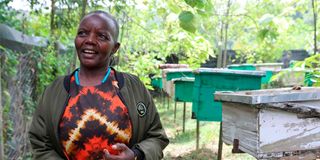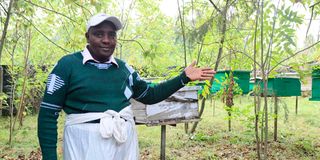
Magdalene Wanjiku Mwaura, a farmer and beekeeper in Ndabibi, Eburu Forest, Naivasha.
Nestled within the larger Mau Forest Complex in Kenya’s Central Rift Valley, the Eburu Forest, is a vital ecological zone.
Known as one of Kenya’s key “water towers,” it contributes significantly to the catchments of lakes Naivasha and Elementaita. The forest sits on the slopes of Mount Ol Donyo Eburu, an ancient volcanic massif rich in biodiversity and home to countless endemic plant and animal species.
But over the past decades, this lush ecosystem has faced increasing degradation. From illegal logging to charcoal burning and unsustainable farming, the once-thriving forest was on the brink of collapse, as soil erosion and loss of biodiversity, resulted into declining crop yields.
But amid this crisis, a remarkable transformation has unfolded, led by the local community of Ndabibi. Their secret? Bees.

Magdalene Wanjiku Mwaura, a farmer and beekeeper in Ndabibi, Eburu Forest, Naivasha.
Magdalene Wanjiku, a long-time farmer in Ndabibi, recalls the challenges of the past. “I used to farm maize and beans, but it reached a point where my farm was no longer productive. What I was getting from my land wasn’t viable,” she says.
Like many others, Wanjiku watched her yields diminish year after year. But when apiculture — beekeeping — was introduced, things began to change.
“Now that we have bees, they walk in our farms and fruit trees, and we’re getting good yields again,” she adds. Bees, it turns out, don’t just produce honey; they’re powerful pollinators. Their presence has improved the productivity of crops and helped rejuvenate local ecosystems.

Francis Njogu Mbutu, chairman of the Hifadhi Farmers Co-operative in Ndabibi, Eburu Forest, Naivasha.
The transformation of Ndabibi’s relationship with Eburu Forest can largely be attributed to Hifadhi Farmers Cooperative, founded in 2014 under the leadership of Francis Njogu Mbutu. Before establishing the cooperative, community efforts were scattered and ineffective. Illegal logging and charcoal burning were rampant.
“Our forest was so destroyed,” Mbutu recalls. “People were coming from as far as Kinangop to burn charcoal. There was no sense of ownership.”
The formation of a Community Forest Association (CFA) in 2012, mandated under Kenya’s Forest Conservation and Management Act, was the first step. But it was the founding of the cooperative that really brought structure and economic incentive to conservation.
Modern bee hives
Starting with just 50 traditional log hives, the cooperative has grown to manage over 700 modern bee hives. Through partnerships with organisations such as FAO’s Forest and Farm Facility (FFF), Hifadhi Farmers Cooperative received training in beekeeping, governance, and value addition.
The cooperative’s success goes beyond honey. As Wanjiku explains, “We were taught how to make oil and wax from bee products. I saw a business opportunity.” She now sells oil locally, with prices ranging from Sh50 to Sh150, supplementing her income in ways she never thought possible.
“With just five hives, I can earn over Sh100,000 a year,” she says. “Compare that to maize, where I’d maybe get Sh30,000 for a whole acre — and after much more work.”
The low-maintenance nature of beekeeping, combined with its high returns, has made it attractive to farmers disillusioned with traditional agriculture. And perhaps most importantly, it has reshaped how the community views the forest.
“Before, you’d grow five acres of maize for a small profit. Now, even with five hives, you get better returns,” says Wanjiku “We’ve learned that the forest is our friend. We protect it because the bees depend on it.”
The cooperative has also brought in younger generations, bridging a vital gap in rural development. According to Stephen Kamau, the cooperative’s accountant, Hifadhi now has 561 members, including 144 youth.
“We’ve ensured that youth make up at least 25 per cent to 30 per cent of every training session. They’re leading in marketing, social media, and even AI-powered advertisements,” he says.
The cooperative’s digital evolution has helped connect rural products with wider markets. In 2024 alone, the group harvested 2.3 tonnes of honey, generating gross revenues of about Sh1.9 million. With 30 per cent retained to support cooperative operations, the rest goes directly to the farmers.






